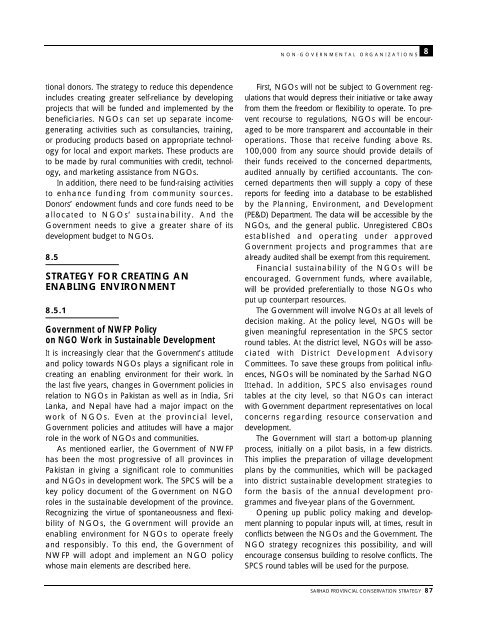Sarhad Provincial Conservation Strategy - IUCN
Sarhad Provincial Conservation Strategy - IUCN
Sarhad Provincial Conservation Strategy - IUCN
Create successful ePaper yourself
Turn your PDF publications into a flip-book with our unique Google optimized e-Paper software.
tional donors. The strategy to reduce this dependence<br />
includes creating greater self-reliance by developing<br />
projects that will be funded and implemented by the<br />
beneficiaries. NGOs can set up separate incomegenerating<br />
activities such as consultancies, training,<br />
or producing products based on appropriate technology<br />
for local and export markets. These products are<br />
to be made by rural communities with credit, technology,<br />
and marketing assistance from NGOs.<br />
In addition, there need to be fund-raising activities<br />
to enhance funding from community sources.<br />
Donors’ endowment funds and core funds need to be<br />
allocated to NGOs’ sustainability. And the<br />
Government needs to give a greater share of its<br />
development budget to NGOs.<br />
8.5<br />
S T R ATEGY FOR CREATING AN<br />
ENABLING ENVIRONMENT<br />
8.5.1<br />
G o v e rnment of NWFP Policy<br />
on NGO Work in Sustainable Development<br />
It is increasingly clear that the Government’s attitude<br />
and policy towards NGOs plays a significant role in<br />
creating an enabling environment for their work. In<br />
the last five years, changes in Government policies in<br />
relation to NGOs in Pakistan as well as in India, Sri<br />
Lanka, and Nepal have had a major impact on the<br />
work of NGOs. Even at the provincial level,<br />
Government policies and attitudes will have a major<br />
role in the work of NGOs and communities.<br />
As mentioned earlier, the Government of NWFP<br />
has been the most progressive of all provinces in<br />
Pakistan in giving a significant role to communities<br />
and NGOs in development work. The SPCS will be a<br />
key policy document of the Government on NGO<br />
roles in the sustainable development of the province.<br />
Recognizing the virtue of spontaneousness and flexibility<br />
of NGOs, the Government will provide an<br />
enabling environment for NGOs to operate freely<br />
and responsibly. To this end, the Government of<br />
NWFP will adopt and implement an NGO policy<br />
whose main elements are described here.<br />
N O N - G O V E R N M E N T A L O R G A N I Z A T I O N S 8<br />
First, NGOs will not be subject to Government regulations<br />
that would depress their initiative or take away<br />
from them the freedom or flexibility to operate. To prevent<br />
recourse to regulations, NGOs will be encouraged<br />
to be more transparent and accountable in their<br />
operations. Those that receive funding above Rs.<br />
100,000 from any source should provide details of<br />
their funds received to the concerned departments,<br />
audited annually by certified accountants. The concerned<br />
departments then will supply a copy of these<br />
reports for feeding into a database to be established<br />
by the Planning, Environment, and Development<br />
(PE&D) Department. The data will be accessible by the<br />
NGOs, and the general public. Unregistered CBOs<br />
established and operating under approved<br />
Government projects and programmes that are<br />
already audited shall be exempt from this requirement.<br />
Financial sustainability of the NGOs will be<br />
encouraged. Government funds, where available,<br />
will be provided preferentially to those NGOs who<br />
put up counterpart resources.<br />
The Government will involve NGOs at all levels of<br />
decision making. At the policy level, NGOs will be<br />
given meaningful representation in the SPCS sector<br />
round tables. At the district level, NGOs will be associated<br />
with District Development Advisory<br />
Committees. To save these groups from political influences,<br />
NGOs will be nominated by the <strong>Sarhad</strong> NGO<br />
Ittehad. In addition, SPCS also envisages round<br />
tables at the city level, so that NGOs can interact<br />
with Government department representatives on local<br />
concerns regarding resource conservation and<br />
development.<br />
The Government will start a bottom-up planning<br />
process, initially on a pilot basis, in a few districts.<br />
This implies the preparation of village development<br />
plans by the communities, which will be packaged<br />
into district sustainable development strategies to<br />
form the basis of the annual development programmes<br />
and five-year plans of the Government.<br />
Opening up public policy making and development<br />
planning to popular inputs will, at times, result in<br />
conflicts between the NGOs and the Government. The<br />
NGO strategy recognizes this possibility, and will<br />
encourage consensus building to resolve conflicts. The<br />
SPCS round tables will be used for the purpose.<br />
SARHAD PROVINCIAL CONSERVATION STRATEGY 87

















